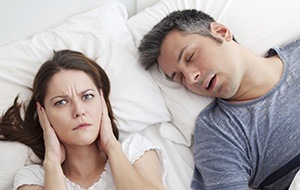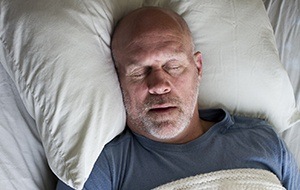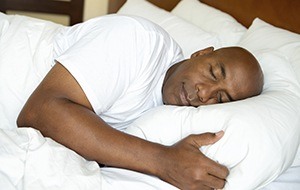Snoring & Sleep Apnea Treatment – Jacksonville, FL
Start Getting the Rest You Deserve
Are you feeling tired? The Centers for Disease Control and Prevention (CDC) estimate that anywhere between 50-70 million Americans suffer from sleep-related disorders. Two of the most prevalent issues in this category include snoring and obstructive sleep apnea. Not only are these problems irritating for the individual (and their family members), but they can have serious long-term health implications. That’s why at North Jacksonville Complete Dentistry, we’re determined to help you start getting the rest you deserve! Read on to learn more about our snoring and sleep apnea treatment and give us a call today to schedule your next appointment.
Why Choose Jacksonville Complete Dentistry for Snoring & Sleep Apnea Treatment?
- Custom-Made Oral Appliances for Each Patient
- Partnered with Local Sleep Specialists for Accurate Diagnosis
- Proven CPAP Alternative That’s More Comfortable & Less Invasive
What is Obstructive Sleep Apnea?

In the clinical sense, sleep apnea apnea is defined as a "cessation of breath during sleep". Obstructive sleep apnea happens when the soft tissues of the mouth and throat relax and close off the airway during sleep, causing an interruption in breathing. When we are awake, our brain simply forces air past these tissues. By contrast, during sleep many people have periods of time when they do not breathe. Each of these can occur individually but are often found together.
Signs & Symptoms of Sleep Apnea

Since sleep apnea occurs while you’re sleeping, it can be difficult to know if you have it. In fact, many people don’t even know they have sleep apnea. You may find yourself waking up from sleep gasping for air or waking up from snoring so loudly. Oftentimes patients report headaches and jaw soreness in the morning, accompanied by lasting fatigue and a bad mood throughout the day. Your bed partner will likely be able to tell you if you snore, stop breathing, or grind your teeth in your sleep, and your dentist can often find signs of enamel wear from teeth grinding. However, the most reliable way to find out if you have sleep apnea is to see a sleep physician for a sleep study and diagnosis.
The Dangers of Sleep Apnea

suffer from sleep apnea, it could be easy to brush this condition off and simply deal with it. However, in truth obstructive sleep apnea can be extremely dangerous and harmful. When sleep apnea occurs and the brain notices that insufficient oxygen is being delivered, it tells the cardiovascular system to work harder than normal. Because of this, the American Sleep Apnea Association has found that people suffering from obstructive sleep apnea are at a higher risk for high blood pressure, heart disease, stroke, and diabetes. Not to mention that daytime drowsiness can easily lead to life-threatening accidents, especially when driving a car.
Sleep Apnea Treatment Options

At North Jacksonville Complete Dentistry, we partner with local sleep doctors to help our patients who are concerned they may have sleep apnea. Once a sleep test has confirmed the presence and severity of sleep apnea, we are happy to help.
The gold standard for sleep apnea treatment is the continuous positive airway pressure (CPAP) machine. This device forces air through the airway during sleep to help the body overcome the obstruction. While it’s the most effective treatment on the market, it’s compliance rate among patients is quite low. Many people end up reducing or eliminating using their CPAP machine because they find it uncomfortable and inconvenient.
That’s where our team steps in. If your sleep doctor and Dr. Bradbury agree, we can create a custom oral appliance to help treat mild to moderate cases of obstructive sleep apnea. This simple, small, mouthguard-like piece is very effective in many cases. It holds the jaw in a slightly forward position while you sleep, which in turn gently stretches the soft tissues in the back of the throat and prevents them from collapsing. Many patients are thrilled at the comfort and convenience of this CPAP alternative treatment for sleep apnea!
Sleep Apnea FAQs
If I Snore, Does That Mean I Have Sleep Apnea?
Although snoring is one of the most common and easily identifiable signs of sleep apnea, it does not necessarily mean that you suffer from OSA. However, it’s important to note that this goes both ways- you may have sleep apnea and not snore. If you discover that you do snore and learn that you do not have OSA, you may be snoring due to age, weight, medications, lifestyle habits, or even sinus issues. However, if you or your partner notices that you do snore quite a lot, you should get a sleep study to find out if OSA is the cause.
Does Dental Insurance Cover Sleep Apnea Treatment?
If you choose to receive an oral appliance from your dentist to treat your sleep apnea, you might think you’ll file a claim with your dental insurance. However, this is unfortunately not the case. Dental insurers often do not offer coverage for items considered a “medical device”, which includes oral appliances for sleep apnea. Instead, our team will help guide you through the process of filing with your medical insurance to make the most of your benefits.
Can Sleep Apnea Lead to Cardiovascular Problems?
When your breathing becomes obstructed due to sleep apnea, you may stop breathing for more than 10 seconds. For some patients, this may happen 100 times a night! Every time breathing is impeded, the brain triggers the body to breathe deeper to overcome the obstruction, which leads to gasping or choking for air. Since this may happen over and over again throughout the night, your blood pressure may rise and fall. Over time, this puts additional strain on your heart, which increases risk of high blood pressure, stroke, heart attack, arrhythmia, or even heart failure.
What Can I Do at Home to Improve My Sleep Apnea Symptoms?
Sleep apnea is a serious medical condition that requires professional treatment. However, there are changes you can make to your daily life that can help improve your situation and minimize the symptoms you might experience, such as:
- Kicking the habit and avoiding all tobacco products
- Limit your alcohol consumption
- Exercise and eat healthy foods to maintain a healthy weight
- Find ways to alleviate stress
